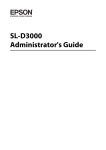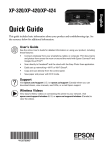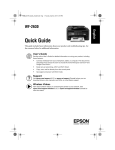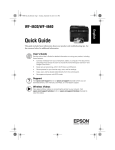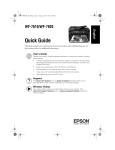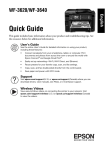Download Epson D3000 Operation Guide
Transcript
SL-D3000 Printer Driver Operation Guide Copyrights and Trademarks All rights reserved. No part of this publication may be reproduced, stored in a retrieval system, or transmitted in any form or by any means, electronic, mechanical, photocopying, recording, or otherwise, without the prior written permission of Seiko Epson Corporation. The information contained herein is designed only for use with this EPSON printer. Epson is not responsible for any use of this information as applied to other printers. Neither Seiko Epson Corporation nor its affiliates shall be liable to the purchaser of this product or third parties for damages, losses, costs, or expenses incurred by the purchaser or third parties as a result of accident, misuse, or abuse of this product or unauthorized modifications, repairs, or alterations to this product, or (excluding the U.S.) failure to strictly comply with Seiko Epson Corporation’s operating and maintenance instructions. Seiko Epson Corporation shall not be liable for any damages or problems arising from the use of any options or any consumable products other than those designated as Original EPSON Products or Epson Approved Products by Seiko Epson Corporation. Seiko Epson Corporation shall not be held liable for any damage resulting from electromagnetic interference that occurs from the use of any interface cables other than those designated as Epson Approved Products by Seiko Epson Corporation. EPSON is registered trademark, SureLab is a trademark, and EPSON Exceed Your Vision is a registered logomark of Seiko Epson Corporation. General Notice: Other product names used herein are for identification purposes only and may be trademarks of their respective owners. Epson disclaims any and all rights in those marks. This information is subject to change without notice. © 2012 Epson America, Inc. 10/12 CPD-38308 2 Contents Contents Installing the Printer Driver You cannot print (because the printer does not work) . 36 The printer sounds like it is printing, but nothing prints. . . . . . . . . . . . . . . . . . . . . . . . . . . . . . . . . . . . . . . . .38 The print outs are not what you expected. . . . . . . . . .38 System Requirements. . . . . . . . . . . . . . . . . . . . . . . . . . . . 4 Supported Operating Systems . . . . . . . . . . . . . . . . . . 4 Connection Configuration . . . . . . . . . . . . . . . . . . . . . 5 Operating Environment . . . . . . . . . . . . . . . . . . . . . . . 5 Installing the Printer Driver . . . . . . . . . . . . . . . . . . . . . . 7 Uninstalling the Printer Driver Printer Driver Functions Main Screen. . . . . . . . . . . . . . . . . . . . . . . . . . . . . . . . . . . 10 Page Layout Screen . . . . . . . . . . . . . . . . . . . . . . . . . . . . 12 Configuration Screen. . . . . . . . . . . . . . . . . . . . . . . . . . . 13 Basic Printing Methods Printing from PhotoShop . . . . . . . . . . . . . . . . . . . . . . . 14 Canceling Printing . . . . . . . . . . . . . . . . . . . . . . . . . . . . . 19 Displaying the Printer Driver Help . . . . . . . . . . . . . . . 20 Displaying Help 1 . . . . . . . . . . . . . . . . . . . . . . . . . . . 20 Displaying Help 2 . . . . . . . . . . . . . . . . . . . . . . . . . . . 20 Printing Using the Printer Driver Functions Color. . . . . . . . . . . . . . . . . . . . . . . . . . . . . . . . . . . . . . . . . 21 Color Settings . . . . . . . . . . . . . . . . . . . . . . . . . . . . . . . 21 Color Controls for Tone . . . . . . . . . . . . . . . . . . . . . . 22 Color Management Using the Application (No Color Adjustment). . . . . . . . . . . . . . . . . . . . . . . . . . . . . . 24 Color Management Using the Printer Driver (ICM) 25 Borderless Printing. . . . . . . . . . . . . . . . . . . . . . . . . . . . . 27 Setting Procedures. . . . . . . . . . . . . . . . . . . . . . . . . . . 27 Printing on Custom Paper . . . . . . . . . . . . . . . . . . . . . . 29 Previewing an Image . . . . . . . . . . . . . . . . . . . . . . . . . . . 31 Saving Printer Driver Settings . . . . . . . . . . . . . . . . . . . 33 Setting Back Printing . . . . . . . . . . . . . . . . . . . . . . . . . . . 34 Configuration Setting the Display Language and Units . . . . . . . . . . . 35 Problem Solver When an Error Message is Displayed . . . . . . . . . . . . . 36 3 Installing the Printer Driver Installing the Printer Driver System Requirements Supported Operating Systems Install the printer driver on the Client PC that will perform printing. The printer driver can be installed under the following operating systems. Make sure that the Client PC meets the following conditions. Operating system Windows XP Professional (SP3) Windows 7 Professional (SP1) 32 and 64 bit versions Installation user account Log in as a user with an "Administrator account" (a user belonging to the Administrators group). Note: During installation, if a message is displayed informing you that an older version of the printer driver is already installed, follow the on-screen instructions to install the new printer driver. 4 Installing the Printer Driver Connection Configuration The Client PC can be connected directly to the printer, or it can be connected to the printer via a Printer PC. Client PC Client PC Printer Printer PC Printer In either situation, the printer driver should be installed on the Client PC. When multiple Client PCs are connected, install the printer driver on each Client PC that will use the printer driver. Also, when multiple printers are connected, install the printer driver for each printer. Operating Environment Install the printer driver under operating environments that meet the following conditions. O The printer's system application has been installed. O The target printer has been added to the Printer List from the Maintenance Utility. O The target printer has completed its Post-operation Check. 5 Installing the Printer Driver Note: If the above requirements are not met, the printer driver may not be installed correctly, and problems could occur in the printer's system application. See the "SL-D3000 Administrator's Guide" for more information on installing the printer's system application. 6 Installing the Printer Driver Installing the Printer Driver Note: O Note the following points when installing. O Do not disconnect the USB cable or the LAN cable connecting the printer to the PC. O Do not turn off the printer or the PC. O The printer has completed its Post-operation Check. O You must log in with an Administrator account. O In Windows 7, if an Administrator password or confirmation is requested, enter the password and then continue with the operation. A B Load the software CD-ROM into the Client PC. C Double-click "Setup.exe" in the "Printer Driver" folder. Open the CD-ROM folder. Double-click the CD-ROM icon in My Computer (or Computer). The Setup screen is displayed. 7 Installing the Printer Driver D If the Adobe RGB ICC profile is not installed, the following screen is displayed. Follow the on-screen instructions to install the profile. If the Adobe RGB ICC profile is already installed, the screen from step is displayed. E When the Adobe RGB ICC profile installation is complete, the printer model selection screen is displayed. Select the appropriate printer, and then click OK. F Select the printer name that you want to connect to, and then click OK. When the Printer PC is connected to the printer, the Printer PC's IP address is added in front of the printer name. Tip: O You can check the printer name in the Maintenance Utility. See the "SL-D3000 Operation Guide" for more information on the Maintenance Utility. O If the connected printer cannot be verified, an error message is displayed and the printer cannot be selected. Check that the printer has been added in the Maintenance Utility. 8 Installing the Printer Driver G Click Port Settings. H Check the port you want to connect to, and then click OK. I Click OK. The port is created using the printer name selected in step . Select this port, and then click OK. This completes this section. Tip: The printer driver's name is registered as "EPSON SL-D3000". Specify this name when printing from other applications. In system configurations that do not use a Printer PC, the "Print Monitor for SL-D3000" driver is registered for use with the system. This cannot be used as a printer driver. 9 Printer Driver Functions Printer Driver Functions The printer driver is software that allows you to print using information and instructions from other applications. The main functions of the printer driver are described below. O Converts print data received from applications into printable data and sends it to the printer. O Specifies print settings such as the media type and size on the settings screen. Main Screen On the Main screen you can set the necessary items and print quality to perform printing. You can also register your settings as Favorite Setting. Item Favorite Setting Explanation You can save the settings you prefer, and then apply them when printing. U“Saving Printer Driver Settings” on page 33 10 Printer Driver Functions Item Print Settings Explanation Paper Type Select the Paper Type according to the paper being used. Image Quality Select the print quality from Standard (720 dpi) and High Image Quality (1440 dpi). Normally, select Standard. Select High Image Quality when you want to print at a higher resolution. Printing takes longer than in Standard mode, as priority is given to image quality. You can only select High Image Quality when Glossy or Luster is set as the Paper Type. Color Select the color adjustment method to apply while printing. U“Color” on page 21 Print Preview Select to display a preview before printing. U“Previewing an Image” on page 31 Paper Source Settings Paper Source Displays Paper Source. You can select only AutoSelect. AutoSelect automatically selects the paper source (front or rear) according to the loaded paper. Paper Size Select the paper size used for printing. You can register sizes that are not already included in the list by using User Defined. U“Printing on Custom Paper” on page 29 Borderless Select to print without margins around the edge of the paper. If this is not selected, margins may appear around the edges of the print, depending on the operating environment and so on. You can also set the amount of the margins from your software. U“Borderless Printing” on page 27 Printer Status Displays the printer's current status. Trimmed Waste Paper Box Displays the usage status of the trimmed waste paper box. Paper Information Displays the width, type, and amount remaining for the loaded paper. Ink Level Displays the ink levels. Reset Defaults Returns all settings to their defaults. 11 Printer Driver Functions Page Layout Screen Item Orientation Copies Back Printing Explanation Click Portrait or Landscape to select the print orientation. This should match the orientation set in the application. Copies Specify the number of copies. Collate Select to print multiple-page documents in sets when printing two or more pages of data. Set Select to print the information you have set for First Line and Second Line on the back of the paper. This is available when the Back printing unit is installed. U“Setting Back Printing” on page 34 First Line Select the information that you want to print on the first line. Second Line Select the information that you want to print on the second line. 12 Printer Driver Functions Configuration Screen Item Language Explanation Select the language used for the printer driver. Auto Select automatically selects Japanese or English depending on the language of the operating system. Unit Settings Select the unit displays. 13 Basic Printing Methods Basic Printing Methods Printing from PhotoShop The following section explains how to print image data on your computer using Adobe Photoshop CS5 as an example. Operations may differ depending on the application being used. For more details, see the instruction manual supplied with your application. A B Start Adobe Photoshop CS5 and open an image. Click Image Size from the Image menu to display the Image Size screen. 14 Basic Printing Methods C Specify the image size and resolution. Select Constrain Proportions, and then match the Width and Height to the paper size to be printed. Specify the Resolution. Here, 360 pixel/inch is set as an example. After making the settings, click OK. Tip: You can create fine prints by setting multiples of the Resolution as the printer's Image Quality resolution. Because the settings for Image Quality are Standard (720 dpi) and High Image Quality (1440 dpi), we recommend making settings in multiples of 180 pixel/inch. D Click Print from the File menu to display the Print screen. 15 Basic Printing Methods E Select this printer from Printer on the Print screen, and then click Print Settings. F Make the necessary settings. Paper Type: Select the paper type to be used for printing. Image Quality: Normally, select Standard. Select High Image Quality when you want to print at a higher resolution. Paper Source: You can only select AutoSelect. This setting cannot be changed. Paper Size: Select the paper size to be used for printing. Make sure you match this to the image size set in step 3. U“Main Screen” on page 10 After making the settings, click OK. Tip: You can only select High Image Quality when Glossy or Luster is set as the Paper Type. Select Print Preview to display a preview of the image before printing. U“Previewing an Image” on page 31 16 Basic Printing Methods G On the Print screen, you can set items such as the orientation and position, as well as make color management settings while checking the image. Tip: O When the printer driver's Color is set to Color Controls (default), select Document as the Color Management setting, and Printer Manages Colors as the Color Handling setting. U“Color” on page 21 O H When performing detailed color management using functions in PhotoShop, match the requirements for Color Management. For more information on PhotoShop functions, see the instruction manual supplied with PhotoShop. U“Color” on page 21 Click Print. Tip: If the image size is larger than the print size, the following screen is displayed. Click Proceed. If you click Cancel, printing is cancelled and you are returned to the application's screen. 17 Basic Printing Methods I Select this printer, and then click Print. Print data is sent to the printer. If you selected Print Preview in step 6, the preview screen is displayed. Tip: Depending on the application you are using, this screen may not be displayed. After performing step 8, print data is sent to the printer. J When the preview screen is displayed, check the image, and then click Print. This completes this section. 18 Basic Printing Methods Canceling Printing This section explains how to cancel printing. You can cancel printing from the computer while sending data. A Double-click the printer icon on the Taskbar to display the print queue. B Select the print data, and then click Cancel from the Document menu. Note: Do not cancel printing when "Print Monitor for SL-D3000" is displayed; otherwise, the system may not operate correctly. Tip: Follow the steps below to open the Print Queue screen. For Windows 7, click Start - Devices and Printers, and then double-click the EPSON SL-D3000 icon. For Windows XP, click Start - Control Panel - Printers and Other Hardware - Printers and Faxes, and then double-click the "EPSON SL-D3000" icon. This completes this section. 19 Basic Printing Methods Displaying the Printer Driver Help See the printer driver's online help for more details on each printer driver screen and each item. Displaying Help 1 Click Help on the printer driver's setting screen. The Help is displayed. From here you can use the contents page to view all of the Help items. Displaying Help 2 Right-click the item, and then click Help. 20 Printing Using the Printer Driver Functions Printing Using the Printer Driver Functions Color Color Settings You can perform color management in the following three ways by using the printer driver for this printer. Choose the best method according to the application you are using, the operating system environment, the aim of the print, and so on. Color Controls for Tone You can manually adjust the print color space and the tone. This is useful when the application you are using does not have its own color control functions. U“Color Controls for Tone” on page 22 Color Management Using the Application (No Color Adjustment) Color management processes are carried out by the application's color management system. This is useful when you want to obtain the same color management results using a common application among different operating system environments. U“Color Management Using the Application (No Color Adjustment)” on page 24 Color Management Using the Printer Driver (ICM) Uses the Windows ICM color management system to process color management. This is effective in producing similar print results from different applications under the same operating systems. However, the application must support color management to perform this type of processing. U“Color Management Using the Printer Driver (ICM)” on page 25 21 Printing Using the Printer Driver Functions Color Controls for Tone You can select sRGB or Adobe RGB to adjust the color space. You can also manually adjust the color tones while viewing a preview of the image. O sRGB: Normally, select sRGB. O Adobe RGB: Select when printing data that contains Adobe RGB color space information. Select Color Controls to fine-tune the brightness, contrast, saturation, color balance, and so on. A When using applications featuring a color management function, specify how to adjust colors from these applications. When using applications without a color management function, start from step 2. Depending on the type of application, make the settings following the table below. Application Color Management Settings Adobe Photoshop CS5 Printer Manages Colors Adobe Photoshop Lightroom 3 Other applications No Color Management Example of Adobe Photoshop CS5 Open the Print screen. Select Color Management and then Document. Select Printer Manages Colors as the Color Handling setting. B Click Print Settings to display the printer driver's settings screen. 22 Printing Using the Printer Driver Functions C On the Main screen, select Color Controls from Color, and then click Advanced.... D Select the Color Correction Method. E Make the necessary settings. See the printer driver's online help for more details on each item. Tip: You can adjust the color while checking the sample image on the left side of the screen. You can also use the color circle to fine-tune the color. F Specify other items to suit your needs, and then print. This completes this section. 23 Printing Using the Printer Driver Functions Color Management Using the Application (No Color Adjustment) Print from applications that support color management. Enable the color management settings in the application, and disable the printer driver's color adjustment function. A Make the settings for color adjustment using the application. Example of Adobe Photoshop CS5 Open the Print screen. Select Color Management and then Document. Select Photoshop Manages Colors as the Color Handling setting, and then select the Printer Profile and the Rendering Intent. Tip: If you are not using an original printer profile, select a profile for each paper type from the Printer profile drop-down menu. B C Click Print Settings to display the printer driver's settings screen. D Specify other items to suit your needs, and then print. On the Main screen, select No Color Adjustment from Color. This completes this section. 24 Printing Using the Printer Driver Functions Color Management Using the Printer Driver (ICM) Use image data in which an input profile has been embedded. The application must also support ICM. A Make the settings for color adjustment using the application. Depending on the type of application, make the settings following the table below. Application Color Management Settings Adobe Photoshop CS5 Printer Manages Colors Adobe Photoshop Lightroom 3 Other applications No Color Management Example of Adobe Photoshop CS5 Open the Print screen. Select Color Management and then Document. Select Printer Manages Colors as the Color Handling setting. When using applications without a color management function, start from step 2. B Click Print Settings to display the printer driver's settings screen. 25 Printing Using the Printer Driver Functions C On the Main screen, select ICM from Color. D Specify other items to suit your needs, and then print. This completes this section. 26 Printing Using the Printer Driver Functions Borderless Printing This function allows you to print your data without margins on all four sides. The printer driver enlarges the print data to a size slightly larger than the paper size and prints the enlarged image. The sections which extend beyond the paper edges are not printed; therefore, resulting in borderless printing. The print data is enlarged by 0.08 inch (1.97 mm) beyond the paper edges on all four sides. Use a setting such as page layout in the application to set the size of the image data as follows. O Match the paper size and page layout for the print data. O If the application has margin settings, specify "0 mm" for the margins. O Make the image data as large as the paper size. Setting Procedures A Display the printer driver's Main screen. B On the Main screen, specify necessary printing items such as Paper Type, Paper Source, and Paper Size. U“Basic Printing Methods” on page 14 27 Printing Using the Printer Driver Functions C Select Borderless. D Specify other items to suit your needs, and then print. This completes this section. 28 Printing Using the Printer Driver Functions Printing on Custom Paper You can also print on paper sizes that are not already available in the printer driver. You can register the following sizes. Width 4, 5, 6, 8, 8.27, 10, 12 inches (102, 127, 152, 203, 210, 254, 305 mm) Length 3.5 to 48 inches (89 to 1219 mm) Note: The available output size is limited depending on the application used for printing. A Display the printer driver's Main screen. B On the Main screen, select User Defined from Paper Size. U“Basic Printing Methods” on page 14 29 Printing Using the Printer Driver Functions C On the User Defined Paper Size screen, enter the name for the paper size, specify the size you want to use, and then click Save. Tip: O To change the paper size you registered, select the paper size name from the list on the left. D O To delete the user-defined size you registered, select the paper size name from the list on the left, and then click Delete. O You can register up to 30 paper sizes. Click OK. This completes the procedure for registering a new paper size to the list box. From now on, you can print using the new paper size by following the normal printing procedures. 30 Printing Using the Printer Driver Functions Previewing an Image You can display a preview of your image before printing. A Display the printer driver's Main screen. B On the Main screen, specify necessary printing items such as Paper Type, Paper Source, and Paper Size. C Select Print Preview. U“Basic Printing Methods” on page 14 31 Printing Using the Printer Driver Functions D Specify other items to suit your needs, and then print. E Check the image on the Print Preview screen. The Print Preview screen is displayed. As well as enlarging or reducing the image by using Zoom, you can also enlarge the image by using Magnify to check the image in more detail. You can also specify whether or not to print each page. See the printer driver's online help for more details on each item. F Click Print. This completes this section. 32 Printing Using the Printer Driver Functions Saving Printer Driver Settings You can save the settings to suit your preferences, and then apply them when printing. A Specify each item for the Main screen and the Page Layout screen that you want to save as your Favorite Setting. B Click Save As Favorite Setting... on the Main screen or the Page Layout screen. C Enter any name in the Name box, and then click Save. Tip: You can save up to 100 settings. D You can select the setting you have registered from Favorite Setting. This completes this section. 33 Printing Using the Printer Driver Functions Setting Back Printing This function allows you to print information used for printing on the back of the paper. Back printing is only available when the Back printing unit is installed. A Display the printer driver's Page Layout screen. B Select Set from Back Printing, and then specify the printable items. U“Basic Printing Methods” on page 14 Item First Line Time Explanation Prints the time. The first character is an A for morning (AM) or a P for afternoon (PM), and the numbers after that indicate the time in the order hours, minutes, and seconds. Example (eight oh five and fifteen seconds in the morning): A080515 Date Prints the date using six characters. The order for Year, Month, Day is displayed according to the Short date setting in Regional and Language Options from your computer's Control Panel. Example (5/24/2010): 052410 Second Line C Number of Prints Prints the number of prints being made. Document Name Up to 40 characters from the file name can be printed. File names longer than 40 characters are abbreviated to fit. Text Prints the entered text. You can enter up to 40 characters. Text Specify other items to suit your needs, and then print. This completes this section. 34 Configuration Configuration Setting the Display Language and Units This function allows you to select the display language and units for the printer driver. A Display the printer driver's Configuration screen. To open the printer driver, right-click this printer's icon in the Devices and Printers folder, and then click Print Settings. Tip: Follow the steps below to display the printer icon. For Windows 7, click Start - Devices and Printers. For Windows XP, click Start - Control Panel - Printers and Other Hardware - Printers and Faxes. B Set the Language and Unit Settings. Tip: When AutoSelect is set for Language, Japanese or English is automatically selected depending on the language of the operating system. C Click OK. This completes this section. 35 Problem Solver Problem Solver When an Error Message is Displayed If an error should occur with the printer (it is not working properly), the control panel light turns on and a message is displayed on the screen informing you of the problem. If you encounter an error message, check the solution on the screen and perform the necessary steps to fix the problem. You cannot print (because the printer does not work) Problem Solution The printer driver is not installed properly. Is the printer icon displayed in the Devices and Printers or the Printers and Faxes folder? O Yes The printer driver is installed. See the following item, "The printer is not communicating with the computer.". O No The printer driver is not installed. Install the printer driver. Does the printer port setting match the printer connection port? Check the printer port. Click the Ports tab on the printer driver's Properties screen, and check that a port with the printer's name is set. If it is not displayed, the printer driver is not installed correctly. Delete and reinstall the printer driver. The printer is not communicating with the computer. Is the cable plugged in properly? Make sure the printer's interface cable is securely plugged into the correct terminal of the computer and the printer. Also, make sure the cable is not broken nor bent. If you have a spare cable, try connecting with the spare cable. Is the pre-operation check complete? The printer is ready after the pre-operation check is complete. See the "SL-D3000 Operation Guide" to confirm if the pre-operation check is complete. You cannot print under the network environment. Are the network settings correct? Ask your network administrator for the network settings. The printer has an error. Confirm if errors have occurred in the printer by checking the lights and messages on the printer's control panel. See the "SL-D3000 Operation Guide" for more information on solving the problem. 36 Problem Solver Problem The printer stops printing. Solution Is the status of print queue Pause? If you stop printing or the printer stops printing because of an error, the print queue enters a Pause status. You cannot print in this status. Double-click the printer icon in the the Devices and Printers or the Printers and Faxes folder, and select Pause from the Printer menu to clear the check. Your problem is not listed here. Determine whether the trouble is caused by the printer driver or the application. Perform a test print from the printer driver so that you can check that the connection between the printer and the computer is correct, and that the printer driver settings are correct. 1. Load paper with a width of 10 or 12 inches (254 or 305 mm) in the printer. 2. Check that the printer is ready to print. 3. Right-click this printer's icon in the Devices and Printers or the Printers and Faxes folder, and then select Properties. 4. Select the General tab on the Properties screen, and then click Print Settings to open the driver's settings screen. Select AutoSelect as the Paper Source, and 254 x 305 mm as the Paper Size, and then click OK. 5. Click Print Test Page on the Properties screen. After a while the printer starts to print a test page. O If the test page is printed correctly, the connection between the printer and computer is correct. Go to the next section. O If the test page is not printed correctly, check the items above again. U“You cannot print (because the printer does not work)” on page 36 The "Driver Version" shown on the test page is the version number of the Windows internal driver. This differs from the Epson printer driver version that you installed. 37 Problem Solver The printer sounds like it is printing, but nothing prints Problem Solution The print head moves, but nothing prints. Confirm the printer operation. See "SL-D3000 Operation Guide" to print a nozzle check pattern, and check the operations and print status for the printer. The nozzle check pattern is not printed correctly. Perform head cleaning. The nozzles may be clogged. See the "SL-D3000 Operation Guide" to print a nozzle check pattern again after performing head cleaning. The print outs are not what you expected Problem Solution Print quality is poor, uneven, too light, or too dark. Are the print head nozzles clogged? If the nozzles are clogged, specific nozzles do not eject ink and the print quality declines. See the "SL-D3000 Operation Guide" to perform a nozzle check. Are the Paper Type settings correct? Check that the Paper type setting switch on the Operation panel matches the paper type setting on the printer. Also, make sure the Paper Type on the Main screen in the printer driver matches the paper loaded in the printer. Have you compared the printing result with the image on the display monitor? Since monitors and printers produce colors differently, printed colors will not always match on-screen colors perfectly. The color is not exactly the same as another printer. Colors vary depending on the printer type due to each printer's characteristics. Because inks, printer drivers, and printer profiles are developed for each printer model, the colors printed by different printer models are not exactly the same. The print is not positioned properly on the paper. Have you specified the print area? Check the print area in the settings of the application and the printer. Is the paper size setting correct? If the Paper Size setting in the printer driver and the size of the loaded paper (width) do not match, the print may not be where you want it, or part of it may be cut off. In this case, check the print settings. Margins appear in borderless printing. Are the settings for the print data in the application correct? Make sure that the paper settings in the application are correct as well as in the printer driver. U“Borderless Printing” on page 27 38 Uninstalling the Printer Driver Uninstalling the Printer Driver Tip: O You must log in with an Administrator account. O In Windows 7, if an Administrator password or confirmation is requested, enter the password and then continue with the operation. A Go to the Control Panel and click Uninstall a program (or Add or Remove Programs). B Select "EPSON SL-D3000 Printer Uninstall" as the software you want to remove, and then click Uninstall/Change (or Change/Remove/Add or Remove). Select Printer Uninstall for this printer. Note: Do not remove "Print Monitor for SL-D3000". The printer's system application is removed. 39 Uninstalling the Printer Driver C Select the target printer icon, and then click OK. D Follow the on-screen instructions to continue. When the removal confirmation message is displayed, click Yes. Restart the computer if you are reinstalling the printer driver. 40










































